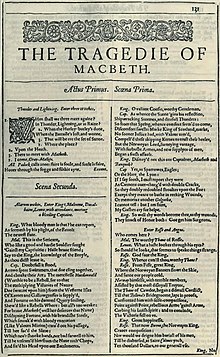
Macbeth Page 2
We found 233 free papers on Macbeth
Essay Examples
Overview
Macbeth, a Tragic Hero
Macbeth
Tragic Hero
Thereby introducing Macbeth the hero, long before he makes his entrance on to the stage. For the audience to recognize the tragic hero, it has to care about what happ ens to the character. The audience is made aware of Macbeth’s tragic flaw, his ambition. He says so himself. Almost immediately after hearing the witches’…
Appearance vs Reality in Macbeth Analysis
Macbeth
Porter, still impacted by a night of heavy drinking, assumes the role of the gatekeeper of hell. In his portrayal, he welcomes sinners into hell, including an individual who possesses the ability to deceive and take either side when weighing arguments. This part of the text is often interpreted as a allusion to Henry Garnet,…
The Power of Evil in Macbeth
Macbeth
The play Macbeth depicts evil as a potent and ruinous force that inflicts harm upon both its adopters and their victims. Both the main character, Macbeth, and his wife Lady Macbeth are entangled in the clutches of this malevolence. Evil compels individuals to partake in unnatural and harmful deeds. Macbeth’s tragic flaw, his insatiable greed,…
the supernatural effect in Macbeth
Macbeth
The SupernatualThere was a strong role of a supernatural force in Macbeth. The witches supposedly had a power to see the future. Or perhaps they had the power to change the future. Then there was the three ghosts that predicted the future. And of course the bloody dagger that appears to Macbeth before is going…
Imagery used by Lady Macbeth
Macbeth
Lady Macbeth mutters key fragments of an imaginary conversation which she recalls having with her husband Macbeth. Lady Machete’s thoughts are being unraveled and her tortured Imagination Is being set free. ‘Out, damned spot! Out, I say! One; two: why, then ‘its time to dot. In this piece of text Lady Macbeth is calling on…
Who Is to Blame for the Death of King Duncan in the Play Macbeth?
Macbeth
In this essay I am going to look at who is to blame for the murder of King Duncan. James I was superstitious and he was paranoid about the supernatural and he was afraid he would be killed. The reason why James I was scared was because he’s family got killed by witches. Kings were…
Kingship in Macbeth
Macbeth
The Elizabethans believed that all creatures in the world had an order where they belonged in the “grand scheme of things.” They believed that God had the most power, then his angels, then the king, then the lords and ladies, then the rich people, then the poor people and finally the animals and creatures of…
Ambition and Power Destory Macbeth
Macbeth
Ambition and Power Destroy Macbeth ‘Thriftless ambition that will ravine up, Thin own life’s means. ” Shakespearean tragedy Macbeth shows the destructive power of uncontrolled ambition and power on a man. Burning ambition and later, uncontrolled power leads to the downfall of all Machete’s ‘life’s means’, that is religion, sanity and a good national relationship….
Similarity of “A Simple Plan” and “Macbeth”
Macbeth
Greed or the extreme desire for something is a powerful theme which was best exemplified in the 1998 movie “A Simple Plan” and the classic Shakespeare’s dark play “Macbeth.” Out of the greediness of the main characters, in both the film and play, comes the more dangerous prodding of their respective partners that eventually spurred…
Movie Review of Macbeth
Macbeth
Movie Review
I chose to rite a movie review as I thought it would be interesting to analyze the differences between the text and one of the movie versions. In particular, I wanted to focus on how Goold, the producer, was TABLE to set the play during the Cold War period and still be TABLE to make…
| originally published | 1606 |
|---|---|
| description | Macbeth is a tragedy by William Shakespeare; it is thought to have been first performed in 1606. It dramatises the damaging physical and psychological effects of political ambition on those who seek power for its own sake. |
| setting | Macbeth is set during the 11th century in Scotland, in the northernmost region of what is now the United Kingdom. ... Over the course of the play, Macbeth moves from his castle in Inverness to the royal palace in Dunsinane., |
| characters | Macbeth, Banquo, Lady Macbeth, Macduff, King Duncan, Three Witches, Malcolm |
| antagonist | Macduff |
| quotations | “By the pricking of my thumbs, something wicked this way comes.”“Infirm of purpose!”“More is thy due than more than all can pay.”“I have bought golden opinions from all sorts of people.”“The attempt and not the deed confounds us.” “Out damned spot!” |
| climax | CLIMAX · Macbeth's murder of Duncan in Act II represents the point of no return, after which Macbeth is forced to continue butchering his subjects to avoid the consequences of his crime. ... By that model, the climax of Macbeth is the fight between Macduff and the Scottish King., |
| information | Playwright: William Shakespeare Central theme: The main theme of Macbeth —the destruction wrought when ambition goes unchecked by moral constraints—finds its most powerful expression in the play’s two main characters. Macbeth is a courageous Scottish general who is not naturally inclined to commit evil deeds, yet he deeply desires power and advancement., |

